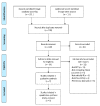Effect of Supplemental Parenteral Nutrition Versus Enteral Nutrition Alone on Clinical Outcomes in Critically Ill Adult Patients: A Systematic Review and Meta-Analysis of Randomized Controlled Trials
- PMID: 32998412
- PMCID: PMC7601814
- DOI: 10.3390/nu12102968
Effect of Supplemental Parenteral Nutrition Versus Enteral Nutrition Alone on Clinical Outcomes in Critically Ill Adult Patients: A Systematic Review and Meta-Analysis of Randomized Controlled Trials
Abstract
Enteral nutrition (EN) is considered the first feeding route for critically ill patients. However, adverse effects such as gastrointestinal complications limit its optimal provision, leading to inadequate energy and protein intake. We compared the clinical outcomes of supplemental parenteral nutrition added to EN (SPN + EN) and EN alone in critically ill adults. Electronic databases restricted to full-text randomized controlled trials available in the English language and published from January 1990 to January 2019 were searched. The risk of bias was evaluated using the Jadad scale, and the meta-analysis was conducted using the MedCalc software. A total of five studies were eligible for inclusion in the systematic review and meta-analysis. Compared to EN alone, SPN + EN decreased the risk of nosocomial infections (relative risk (RR) = 0.733, p = 0.032) and intensive care unit (ICU) mortality (RR = 0.569, p = 0.030). No significant differences were observed between SPN + EN and EN in the length of hospital stay, hospital mortality, length of ICU stay, and duration of mechanical ventilation. In conclusion, when enteral feeding fails to fulfill the energy requirements in critically ill adult patients, SPN may be beneficial as it helps in decreasing nosocomial infections and ICU mortality, in addition to increasing energy and protein intakes with no negative effects on other clinical outcomes.
Keywords: clinical outcomes; intensive care; supplemental parenteral nutrition.
Conflict of interest statement
All authors declare that they have no conflicts of interest concerning the research, authorship, or publication of this article.
Figures



References
-
- Casas M., Mora J., Fort E., Aracil C., Busquets D., Galter S., Jauregui C.E., Ayala E., Cardona D., Gich I., et al. Total enteral nutrition vs. total parenteral nutrition in patients with severe acute pancreatitis. Rev. Esp. Enferm. Dig. 2007;99:264–273. doi: 10.4321/S1130-01082007000500004. - DOI - PubMed
-
- Windsor A.C.J., Kanwar S., Li A.G.K., Barnes E., Guthrie J.A., Spark J.I., Welsh F., Guillou P.J., Reynolds J.V. Compared with parenteral nutrition, enteral feeding attenuates the acute phase response and improves disease severity in acute pancreatitis. Gut. 1998;42:431–436. doi: 10.1136/gut.42.3.431. - DOI - PMC - PubMed
-
- McClave S.A., Taylor B.E., Martindale R.G., Warren M.M., Johnson D.R., Braunschweig C., McCarthy M.S., Davanos E., Rice T.W., Cresci G.A., et al. Guidelines for the Provision and Assessment of Nutrition Support Therapy in the Adult Critically Ill Patient: Society of Critical Care Medicine (SCCM) and American Society for Parenteral and Enteral Nutrition (A.S.P.E.N.) J. Parenter Enter Nutr. 2016;40:159–211. doi: 10.1177/0148607115621863. - DOI - PubMed
Publication types
MeSH terms
Grants and funding
LinkOut - more resources
Full Text Sources
Medical
Research Materials

